This article was written by Richa Arya.
‘Bail’ connotes the process of procuring the release of an accused charged with certain offence by ensuring his future attendance in the court for trial and compelling him to remain within the jurisdiction of the court.[1]
There are various forms of bail. In light of the current debate regarding Arvind Kejriwal’s release on bail it becomes important to understand the minute differences between personal bond and personal bond with surety.
In the order copy putting Arvind Kejriwal into judicial custody, the Metropolitan Magistrate Gomati Manocha says that the Code of Criminal Procedure envisages only two kinds of personal bonds, first being when a person furnishes his own bond with one or more sureties and the second being the execution of own bond without sureties.
The personal bond with one or more sureties would mean that a third person (surety) is made responsible for the obligations of the accused and he would be made to pay the bail amount on the breach of the bail conditions by the accused. In such a situation the court in its discretion asks the person acting as surety to keep collaterals worth the amount of the bail bond as a security with the court.
To know more about concept of bail bond and role of bail bond agents in brief, please refer to the video below:
On the other hand the personal bond without sureties would mean that the person is released on his personal undertaking that he would regularly attend the court and in case of default would forfeit to the government a sum of money. Such a personal bond without sureties is granted by the courts on taking liberal interpretation of the law when the accused is indigent or is unable to furnish the bail bond. The similar concept in USA is that of unsecured bail.
Arvind Kejriwal rejected to take the bail saying that he be granted bail on oral undertaking. But as per the judge there is no such concept of releasing the accused in India. The concept similar to this is the release on personal recognition in USA. Here the accused is released on recognizance when he promises to attend all the judicial proceedings and not to engage in any prohibited activity. Such a bond is an unsecured appearance bond. But no such concept is followed in India.
Arvind Kejriwal claims to have been released without need of any bail in earlier cases filed against him such as the case filed by Shila Dixit’s associate against him and the case by Kapil Sibal’s son against him. He claims to have given only a written assurance of his presence in those cases. But such a written assurance amounted to giving personal bond which the metropolitan magistrate was ready to accept to grant him bail.
Thus Arvind Kejriwal’s demand of release on oral undertaking is not well founded under law. It is a different thing if he is protesting the law itself, as to why should one have to pay for bail in a case like defamation – that is a different case altogether. Thousands of people in Indian jails are languishing despite being charged under bailable offences just because they have been unable to furnish bail money. This is an inhuman and colonial procedure of law which must be amended keeping the changing standards of time in mind.
LawSikho has created a telegram group for exchanging legal knowledge, referrals and various opportunities. You can click on this link and join:
https://t.me/joinchat/J_
[1] Nathurasu v. State, 1998 Cri LJ 1762 (Mad).
 Serato DJ Crack 2025Serato DJ PRO Crack
Serato DJ Crack 2025Serato DJ PRO Crack











 Allow notifications
Allow notifications



What is BW 5000? How much sureity will be taken in BW 5000.